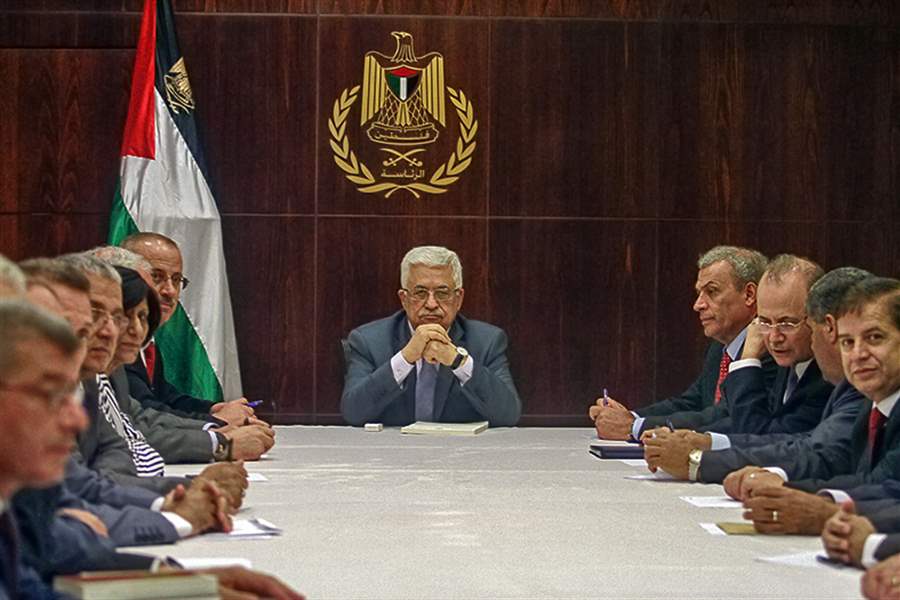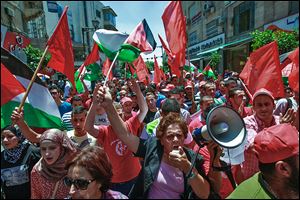
NEGOTIATIONS IN D.C.
Middle East peace talks to resume
Israel agrees to release 104 Palestinian inmates
7/29/2013
President Mahmoud Abbas, center, chairs a Palestinian cabinet session. He refused to engage in peace talks until Israel agreed to release 104 Palestinian prisoners.
ASSOCIATED PRESS

President Mahmoud Abbas, center, chairs a Palestinian cabinet session. He refused to engage in peace talks until Israel agreed to release 104 Palestinian prisoners.
WASHINGTON — The Obama Administration announced that the first direct, substantive peace talks between Israel and the Palestinians in years will begin later today in Washington after Israeli leaders agreed Sunday to release 104 Palestinian prisoners.
Calling it “painful for the entire nation,” Israeli Prime Minister Benjamin Netanyahu won a vote in his cabinet to release the Palestinian prisoners, many convicted of killing Israelis, in order to restart peace talks brokered by Secretary of State John Kerry.
The list of prisoners who may be released in coming days includes Palestinian militants who threw fire bombs, in one case at a bus with children aboard; stabbed and shot civilians, including women, elderly Jews, and suspected Palestinian collaborators; and ambushed and killed border guards, police, security agents, and soldiers.
All of them have been in prison prior to 1993. Some were serving life sentences.
The Israeli public considers them terrorists.
Palestinians see them as freedom fighters struggling to reclaim their homeland and oust the occupiers.
Palestinian Authority President Mahmoud Abbas and his leadership refused to return to the negotiating table without their release.
Whether it was a grudging gesture of goodwill, diplomatic blackmail, or something in between, Mr. Netanyahu made a major concession to Mr. Kerry and the Palestinians.
In a sign of how divided Israel and its coalition government are, the vote among Mr. Netanyahu’s cabinet ministers to release the prisoners was 13 to 7, with two abstentions.
In a parallel move, the Israeli cabinet also approved Mr. Netanyahu’s call for a national referendum that would allow Israeli voters to approve or reject any peace deal he makes.
Israeli officials said the prisoners will be released “in stages” four times over the next nine months, with the first release to take place soon after the initial talks in Washington this week.

Palestinians wave national flags during a protest in the West Bank city of Ramallah Sunday. Some two hundred Palestinians protested against the resumption of peace talks with Israel.
State Department spokesman Jen Psaki said the preliminary talks will be led by Israeli Justice Minister Tzipi Livni and Palestinian chief negotiator Saeb Erekat.
Mr. Erekat called it “a step toward peace.”
More prisoners would be freed as negotiations continue, though Mr. Netanyahu warned that “every Palestinian provocation will result in halting of the prisoner-release process.”
The prime minister called the prisoners he was about to release “depraved people, even if most of them have been in prison for over 20 years.”
This is not the first time Mr. Netanyahu has struck such a deal.
In 2011, the Israeli government traded 1,000 Palestinian and Arab Israeli prisoners for the release of Gilad Shalit, an Israeli soldier abducted by Hamas militants near the Kerem Shalom crossing into the Gaza Strip in 2006. He had been held for five years.
In an “open letter to Israeli citizens” published Saturday night, Mr. Netanyahu explained, “this is an incomparably difficult decision, it is painful for the bereaved families and it is painful for the entire nation and it is also very painful for me.”
While most polls show a majority of Israelis support the peace process, releasing prisoners is unpopular across the political spectrum.
“From time to time, prime ministers are called on to make decisions that go against public opinion — when the matter is important for the country,” Mr. Netanyahu said in the open letter.
The prime minister said dramatic change in the Middle East — in Egypt, Syria, and Iran — not only create challenges, but “considerable opportunities for us” to strike a deal.
He emphasized that while he agreed to release prisoners, and only after talks begin, he rejected a Palestinian demand that he announce a freeze on new construction in the Jewish settlements in the West Bank.
According to Israeli media, Mr. Netanyahu told Mr. Kerry that over the next nine months, as many as 1,000 new units may be approved for construction in West Bank and East Jerusalem.
Mr. Netanyahu was silent on a third Palestinian demand — that negotiations about borders for a future Palestinian state begin with the pre-1967 armistice lines.
Qaddura Fares, president of the Palestinian Prisoners’ Society, welcomed the prisoner release as “the right decision for negotiations.”
“It will only help to create an atmosphere of calm. It shows that state of Israel really does want peace,” he said.
The Palestinian prisoners have all been held since the signing of the 1993 Oslo Accords, which created interim and limited self-government for the Palestinians and Israeli military withdrawal from the West Bank and Gaza Strip. Israel pulled out of Gaza in 2005.
The crimes date to the 1980s and 1990s. The Israeli government has not provided details on who would be released and when.
As Mr. Netanyahu and his cabinet debated the release for over six hours, a few hundred protesters, including family members of those killed by Palestinian prisoners, gathered outside of the prime minister’s office during the vote and waved signs illustrated with bloody palm prints.
Economy Minister Naftali Bennett, the third most powerful politician in the coalition government, joined the protest and said he is against the release.